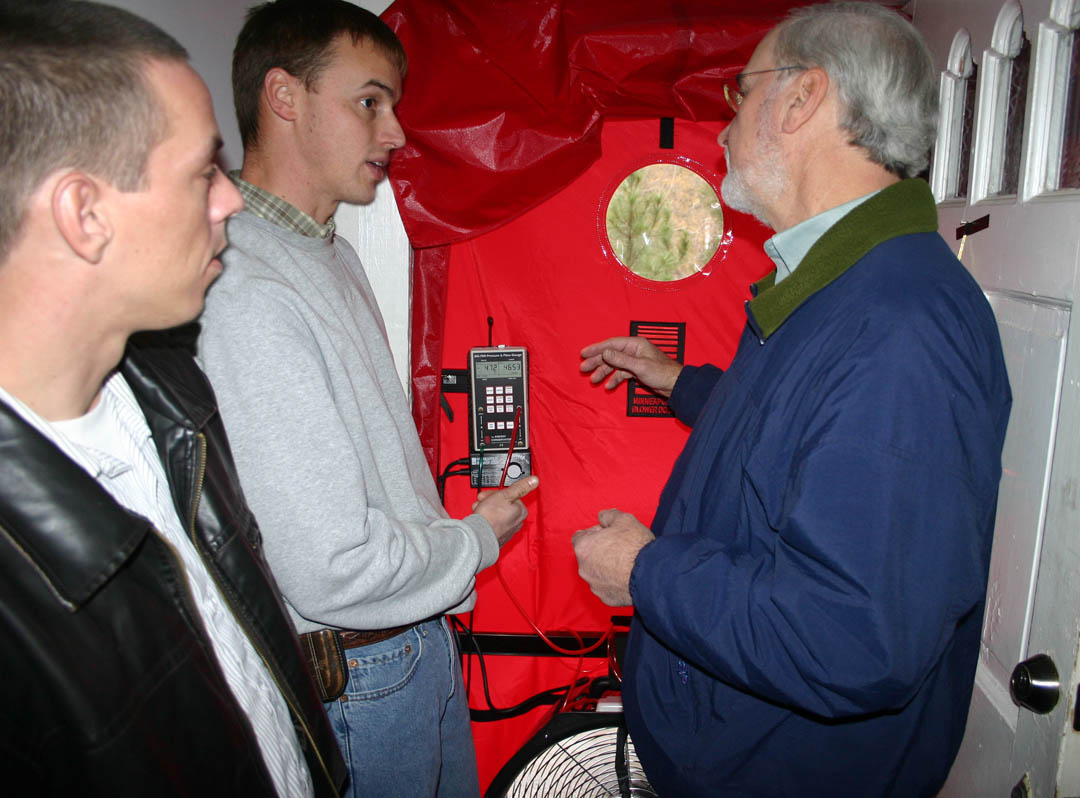College News
CCCC pilots NCCCS - N.C. Weatherization training
Notice: This article is older than 12 months. Names, contact information, programs, titles, etc. might have changed. If you have any problems please call the main college number, 1-800-682-8353, and we will be happy to direct you accordingly.

click image to enlarge ⊗
Central Carolina Community College held a pilot program for home weatherization crew training on Dec. ... (more)
12.18.2009 • College & Community • College General
PITTSBORO — Central Carolina Community College is a major player in the N.C. Weatherization Office’s efforts to improve home energy efficiency and comfort.
The college just completed a pilot program for the training of weatherization crew members at the request of the Weatherization Office and the North Carolina Community College System. Wilson Community College was the only other of the state’s 58 community colleges chosen to carry out a pilot program. Both were recently completed.
“We are honored that our college was selected as one of the two to offer the pilot program,” said Carl Thompson, Central Carolina C.C. Continuing Education director for Chatham County. “It is a recognition of the work we are already doing in training the workforce in the fields of green building and weatherization.”
Representatives from the Weatherization Office, NCCCS, Joint Orange-Chatham Community Action Agency, Central Carolina C.C., Wilson C.C., and several other community colleges met Dec. 15 at Central Carolina’s Chatham County Campus in Pittsboro.
They reviewed the results of the pilot programs and developed a draft outline of a curriculum, “Weatherization Assistance Program Crew Basics,” to be offered through community college Continuing Education Departments. The program will consist of 24 hours of training over three days in areas such as duct sealing, installing insulation, base-load measurements of electricity and water usage, air sealing, and safety.
Instructors will be trained to carry out the curriculum as the program is expanded to four other community colleges in the state: Caldwell, Davidson, Haywood, and Rowan-Cabarrus. Future expansion to other community colleges is expected. The goal is to train enough weatherization crew members to meet the anticipated demand.
“There has been a ramp-up in federal funding for weatherization and an increase in the number of eligible families, so there are not enough trained weatherization crew members,” said Laura Lauffer, Central Carolina’s Sustainability coordinator. “The goal of the training program is to train weatherization crew members with sound building science and energy efficiency skills to make increasing the energy efficiency and indoor air quality in all the homes in the program possible.”
According to Evans Taylor, N.C. Weatherization Office director, approximately 22,000 homes will receive Weatherization Assistance Program services before March 2012, a sharp increase over previous years. The increase is the result of two factors: $132 million for the state’s WAP from the 2009 federal American Reinvestment and Recovery Act, and expanding eligibility for the assistance to families making up to 200 percent of the federal poverty guidelines. For a family of four, that figure is $44,100.
The Weatherization Assistance Program provides funding to local community action agencies, which do the weatherization work or contract to have it done. When the new curriculum is in place, contractors will have to have crews with this training or prove they have the same skills in order to bid on CAA weatherization contracts.
The crew training program is an outgrowth of Code Green, an initiative established by the N.C. State Board of Community Colleges in February. Code Green includes a commitment by the system to a major expansion of training for the green-collar workforce, including weatherization.
Lauffer took part in Code Green and the Weatherization Task Force that was established to help implement it. As a result, the NCCCS asked Central Carolina to offer faculty training in building science through the Building Performance Institute, the only community college asked to do so. The goal was to increase the NCCCS’s pool of faculty with appropriate credentials in building science and energy efficiency upgrades.
The success of that training led to the pilot crew training program and the Dec. 15 meeting to develop the curriculum for the N.C. WAP Crew Basics program.
The Weatherization Office and NCCCS are also planning to train workers to do energy audits and job site supervision for weatherization projects. Central Carolina will also be involved in that training.
“Being part of the Weatherization Office and NCCCS’s plans for weatherization training helps us grow our sustainability programs,” Lauffer said. “When our new Sustainability Classroom and Lab Building is completed in the fall, we see ourselves as the training center for the state in this area. We see ourselves on the forefront of training technicians and helping to build the green economy, increasing sustainability through energy efficiency and job development.”
For more information on Central Carolina Community College’s Green Building/Renewable Energy programs, including weatherization, go to the college’s web site: www.cccc.edu/green/ or call Lauffer, (919) 542-6495, ext. 236. For more information on the Weatherization Assistance Program, go to: www.energync.net/weatherization.pdf.
Categories
- Admin, Faculty & Staff Category
- Arts & Entertainment Category
- Clubs Category
- College & Community Category
- College General Category
- Continuing Education Category
- Curriculum Programs Category
- Distance Education Programs Category
- Facilities/Buildings Category
- Finances Category
- Foundation Category
- Graduations Category
- Lee Early College Category
- NCCCS Category
- SGA Category
- Special Events Category
- Sports Category
- Students/Graduates Category
- Uncategorized Category
Archives

